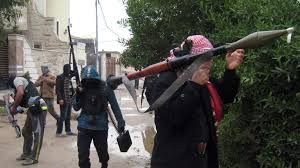Two more towns fall to armed fighters in Iraq
“Towns fall to unidentified fighters after security forces in Diyala province lay down weapons and leave posts.”
Rebels in Iraq have gained more ground in Iraq overnight, moving into two strategically-important towns in the province of Diyala, northeast of Baghdad, after security forces abandoned their posts.
Armed men, who have not yet been identified, entered the towns of Jalulah and Saaiydiyah and used loudspeakers to tell local police that if they laid down their weapons and left their posts they would not be hurt, locals told Al Jazeera.
The security forces complied and left the towns, they said.
Witnesses and an Al Jazeera journalist in Diyala said the men then promised locals they would be unhurt.
Security sources told the Reuters news agency that several other villages in Diyala, around the Himreen mountains, which have long been a hideout for armed groups, had also fallen to rebels.
The Iraqi army fired artillery at Saaiydiyah and Jalulah from the nearby town of Muqdadiya, sending dozens of families fleeing towards Khaniqin, near the Iranian border, security sources said.
The armed men said Muqdadiya was their next target, according to locals.
RELATED: Fall of Mosul: What’s at stake for the Kurds?
Fighters from the Islamic State in Iraq and the Levant (ISIL) overran the northern city of Mosul earlier this week and
have since pressed south towards Baghdad in an onslaught against the Shia-led government.
US President Barack Obama threatened US military strikes against the mainly Sunni group who want to establish their own state in Iraq and Syria.
“I don’t rule out anything because we do have a stake in making sure that these jihadists are not getting a permanent foothold in either Iraq or Syria,” Obama said at the White House when asked whether he was contemplating air strikes.
Obama said he was looking at “all options” to help Iraq’s leaders, who took full control when the US occupation ended in 2011.
“In our consultations with the Iraqis, there will be some short-term immediate things that need to be done militarily,” he said.
Officials later stressed that ground troops would not be sent in.
Obama also referred to longstanding US omplaints that Prime Minister Nuri al-Maliki had failed to do enough to heal a sectarian rift that has left many in the large Sunni minority, who were shut out of power when US troops overthrew Saddam Hussein in 2003, nursing grievances.
“This should be also a wakeup call for the Iraqi government. There has to be a political component to this,” Obama said.

